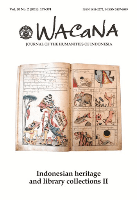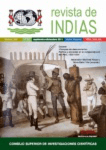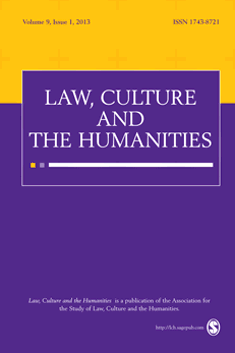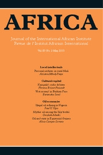
Wacana-Jurnal Ilmu Pengetahuan Budaya-Journal of the Humanities of Indonesia
Scope & Guideline
Celebrating Indonesia's Diverse Human Experience.
Introduction
Aims and Scopes
- Cultural Studies and Representation:
The journal extensively covers cultural representation, exploring how various forms of media and literature depict Indonesian culture and identity, often through the lens of gender and social dynamics. - Historical Contextualization:
It emphasizes the importance of historical narratives, particularly regarding colonial encounters and post-colonial perspectives, providing insights into the complexities of Indonesia's past. - Interdisciplinary Approaches:
The journal promotes interdisciplinary research, integrating perspectives from anthropology, sociology, history, and literature to enrich discussions on Indonesian cultural and social issues. - Gender Studies and Feminism:
A significant focus on gender dynamics, women's roles, and feminist discourse in Indonesian society, highlighting the contributions and challenges faced by women throughout history. - Travel and Exploration Narratives:
The journal features analyses of travel accounts and narratives, examining how these texts shape perceptions of Indonesia and contribute to cultural exchanges. - Decolonial Perspectives:
It seeks to challenge colonial legacies and promote decolonial thought, aiming to reframe historical narratives and cultural practices in Indonesia.
Trending and Emerging
- Intersectionality in Gender Studies:
An increasing focus on intersectionality within gender studies highlights the diverse experiences of women in Indonesia, addressing how factors such as ethnicity, class, and colonial history intersect to shape identities. - Decolonial and Postcolonial Discourse:
Emerging themes around decolonial thought and postcolonial critiques are gaining traction, as researchers seek to unpack and challenge colonial narratives and their lingering effects on contemporary Indonesian society. - Cultural Memory and Heritage:
A growing interest in cultural memory and heritage preservation indicates a trend towards understanding how historical narratives shape present identities and cultural practices in Indonesia. - Environmental Humanities:
There is a marked increase in studies that integrate environmental concerns with cultural and historical contexts, reflecting a broader interest in sustainability and ecological perspectives within the humanities. - Digital Humanities and Media Studies:
Emerging themes in digital humanities and media studies reflect the impact of technology on culture and society, exploring how digital platforms influence cultural discourse and representation.
Declining or Waning
- Traditional Linguistic Studies:
Research focusing solely on traditional linguistic analysis appears to be declining, with less emphasis on purely grammatical studies and more focus on applied linguistics and sociolinguistic contexts. - Colonial Literature Analysis:
The specific analysis of colonial literature, while still present, seems to be less frequent as the journal shifts towards broader themes of cultural representation and contemporary issues. - Historical Biographies:
There is a noticeable reduction in the publication of historical biographical studies, as the journal increasingly prioritizes thematic and interdisciplinary approaches over individual historical narratives. - Narrow Regional Studies:
Studies that focus exclusively on specific regions without broader cultural or historical implications are less common, indicating a trend towards more holistic and integrative research. - Conventional Environmental Studies:
Traditional environmental studies that do not incorporate cultural or social dimensions are becoming less prominent, as the journal emphasizes the interplay between environment, culture, and society.
Similar Journals

REVISTA DE INDIAS
Navigating the Complexities of Culture and HistoryREVISTA DE INDIAS is a leading academic journal published by the Consejo Superior Investigaciones Cientificas (CSIC) in Spain, dedicated to the interdisciplinary study of cultural and historical dynamics within the context of Latin American societies. Established with a commitment to open access since 1996, the journal invites contributions that explore themes pertinent to Cultural Studies, History, Sociology, and Political Science. In the latest evaluation, it has secured notable Q2 rankings in both Cultural Studies and History, further positioning itself as a pivotal resource for researchers, professionals, and students in these fields. With Scopus ranking the journal within the top 69th percentile in Arts and Humanities, REVISTA DE INDIAS plays an essential role in disseminating high-quality scholarly work that sheds light on the complexities of cultural and historical narratives, making it an invaluable platform for academic debate and knowledge exchange.

Law Culture and the Humanities
Advancing Interdisciplinary Insights in Law and CultureLaw Culture and the Humanities, published by SAGE Publications Ltd, serves as a pivotal forum for interdisciplinary dialogue at the intersection of law and the humanities. With an ISSN of 1743-8721 and an E-ISSN of 1743-9752, this esteemed journal has been contributing to scholarly discourse since its inception in 2005 and continues to do so until 2024. The journal carries a respectable impact factor showcased through its category rankings: Q3 in Arts and Humanities (miscellaneous), Q2 in Cultural Studies, and Q3 in Law. Its Scopus rankings reflect an impressive standing in the social sciences, particularly within Cultural Studies and Law, indicating that it is a fundamental resource for researchers and professionals aiming to explore the nuanced relationships between legal frameworks and cultural expressions. While not an Open Access journal, it offers substantial insights into contemporary debates, making it essential for academics and students engaged in the study of law's cultural dimensions.

AFRICA
Navigating the Intersection of Anthropology and ArtsAFRICA is a premier journal published by Cambridge University Press, dedicated to advancing scholarly research and discourse within the realms of Anthropology, Arts and Humanities, and Geography. Established in 1928, this journal has demonstrated an unwavering commitment to excellence, consistently achieving Q1 status in its respective fields as of 2023, demonstrating its impact and prestige in the academic community. With Scopus rankings highlighting it among the top 80th percentile in Social Sciences and 72nd percentile in Arts and Humanities, AFRICA serves as a vital resource for researchers, professionals, and students seeking to explore the complexities of African societies and cultures. The journal promotes a multidisciplinary approach, encouraging contributions that address contemporary challenges and opportunities within Africa. Although access is not open, AFRICA remains an essential asset for anyone aiming to deepen their understanding of the continent's diverse narratives and dynamics, publishing high-quality, peer-reviewed articles that shape the future of African studies.

Itineraria
Fostering Insightful Dialogues across DisciplinesItineraria is an esteemed academic journal dedicated to the exploration of historical and cultural landscapes, primarily focusing on the intricate narratives within the realms of Arts and Humanities, Classics, and History. Published by SISMEL EDIZIONI GALLUZZO, this journal serves as a vital platform for scholars and researchers from a diverse array of disciplines to disseminate innovative research and foster meaningful discourse. Though currently classified in the Q4 quartile across various categories, Itineraria progressively seeks to elevate its impact and relevance in academic circles, boasting converged publication years from 2019 to 2023. The journal's commitment to rigorous academic standards is reflected in its integration within recognized databases, while offering a unique perspective on historical and contemporary issues. While the journal does not have open access options at this time, it remains a critical resource for those endeavoring to deepen their understanding of the intricate links between culture and history in an engaging and scholarly manner. The journal is based in Italy, contributing to a rich academic tradition.

Philobiblon-Transylvanian Journal of Multidisciplinary Research in Humanities
Fostering Interdisciplinary Insights in HumanitiesPhilobiblon-Transylvanian Journal of Multidisciplinary Research in Humanities is a pivotal publication dedicated to fostering interdisciplinary dialogue within the humanities. With its ISSN 1224-7448 and E-ISSN 2247-8442, this journal is published by BIBLIOTECA CENTRALA UNIV LUCIAN BLAGA CLUJ-NAPOCA, situated in the culturally rich context of Cluj-Napoca, Romania. Since transitioning to an Open Access model in 2021, Philobiblon has embraced the ethos of widespread knowledge dissemination, encouraging scholars, researchers, and students alike to engage with its thought-provoking content. Although currently ranked Q4 in the 2023 Arts and Humanities category, with a Scopus rank of 162/173, the journal demonstrates a commitment to developing its academic stature through interdisciplinary research that spans the arts and humanities. Covering a wide time frame from 2011 to 2024, the journal aims to contribute meaningful insights into various subjects, fostering innovative discussions and scholarly exchanges in a rapidly evolving academic landscape.

Epohi
Cultivating a Vibrant Academic Community.Epohi is a distinguished academic journal published by the St Cyril and St Methodius University Publishing House, focusing on interdisciplinary research in the fields of social sciences and humanities. With its ISSN 1310-2141 and E-ISSN 2534-8418, the journal aims to provide a platform for innovative thought and scholarly discourse, bridging gaps between historical perspectives and contemporary issues. While currently exploring open access options to enhance accessibility, Epohi remains a pivotal resource for researchers, professionals, and students seeking to contribute to and engage with cutting-edge research. Situated in the serene locale of Veliko Tarnovo, Bulgaria, this journal not only enriches the academic landscape but also fosters collaboration and professional growth in the broader scholarly community.

Cinema-Journal of Philosophy and the Moving Image
Illuminating Cinema through Philosophical Inquiry.Cinema: Journal of Philosophy and the Moving Image is a distinguished open-access journal dedicated to the critical analysis of cinema through the lenses of philosophy and cultural theory. Published by the esteemed New University of Lisbon's IFILNOVA - Nova Philosophy Institute, this journal has been a crucial platform for the dissemination of innovative and interdisciplinary research since its establishment in 2010. With an ISSN of 1647-8991 and a significant presence in both Communication and Visual Arts categories, it currently holds a Q4 ranking in 2023, reflecting its growing role in the academic discourse of its field. While the journal has a modest impact as indicated by its Scopus rankings, it serves as a vital resource for researchers, professionals, and students interested in the intersection of philosophy and the moving image, fostering rich dialogues about cinema's impact on society and culture. Situated in Portugal, Cinema invites submissions that challenge conventional perceptions, engaging with both contemporary and historical contexts of film and imagery, thereby playing an essential role in expanding the horizons of film studies.

Revista Tefros
Cultivating Knowledge, Inspiring ChangeRevista Tefros is a premier academic journal published by UNIV NACL RIO CUARTO and TALLER ETNOHISTORIA FRONTERA SUR, focusing on the interdisciplinary fields of social sciences and humanities with a particular emphasis on ethnography and cultural studies. Since its launch in 2005, this Open Access journal has provided an invaluable platform for researchers, professionals, and students to disseminate their findings and engage with innovative scholarship. With an ISSN of 1669-726X and an E-ISSN of 1667-9229, Revista Tefros invites contributions that explore diverse cultural narratives and social dynamics, thereby enriching the academic dialogue. The journal is dedicated to promoting accessibility in research publication, ensuring that valuable insights are available to a broader audience. As part of its commitment to excellence, the journal strives to uphold high standards of scholarship and aims to contribute meaningfully to the academic community in Argentina and beyond.

Journal of Belgian History-Revue Belge d Histoire Contemporaine-Belgisch Tijdschrift voor Nieuwste Geschiedenis
Connecting Scholars Through Belgian HeritageThe Journal of Belgian History-Revue Belge d'Histoire Contemporaine-Belgisch Tijdschrift voor Nieuwste Geschiedenis is a prominent academic publication dedicated to the exploration and analysis of contemporary Belgian history. Published by SOMA-CEGES, this journal serves as a vital resource for researchers, professionals, and students alike, providing a platform for scholarly discourse and the dissemination of innovative research in the field. Despite its historical significance, the journal faced a hiatus in its Scopus coverage from 2019, yet it retains a strong identity within the Arts and Humanities category, holding a Scopus rank of #1123 out of 1328, placing it in the 15th percentile. This underscores the opportunities for growth and impactful contributions within the journal's scope. By focusing on the intricacies of Belgian history, the journal encourages rigorous investigation and a deeper understanding of Belgium's past, making it an essential reference for anyone interested in European historical narratives.

Southern African Humanities
Unveiling the rich tapestry of Southern African history.Southern African Humanities is an esteemed academic journal published by the Natal Museum, dedicated to advancing the fields of anthropology, archaeology, and cultural studies with a particular focus on the Southern African context. Since its inception in 2008, the journal has consistently provided a platform for innovative research and scholarly discourse, earning a prominent reputation with a 2023 impact factor that places it in the Q2 and Q1 quartiles across multiple relevant categories, including Anthropology, Archaeology, and History. The journal is recognized for its rigorous peer-review process and dissemination of high-caliber research, exemplified by its Scopus rankings, which reflect its widespread influence within the humanities. Although it does not currently offer open access options, the journal remains pivotal for researchers, professionals, and students aiming to deepen their understanding of Southern African cultures and historical contexts. Located in Pietermaritzburg, South Africa, Southern African Humanities continues to be an essential resource for those engaged in the humanities, enhancing knowledge and fostering research collaborations within the region and beyond.